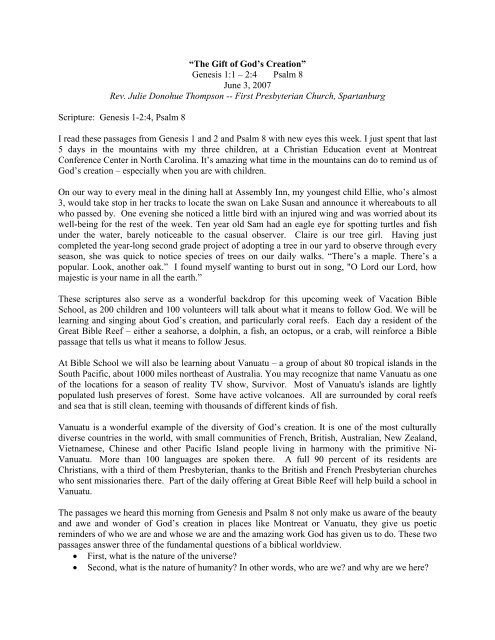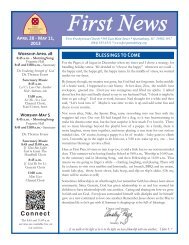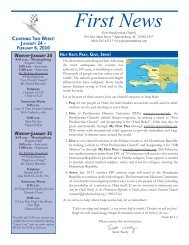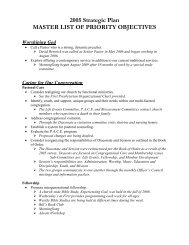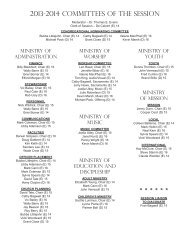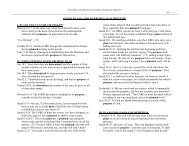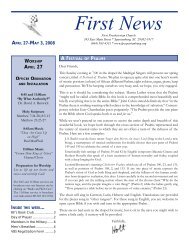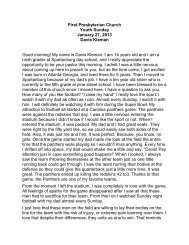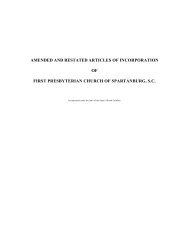Julie Thompson - First Presbyterian Church
Julie Thompson - First Presbyterian Church
Julie Thompson - First Presbyterian Church
You also want an ePaper? Increase the reach of your titles
YUMPU automatically turns print PDFs into web optimized ePapers that Google loves.
“The Gift of God’s Creation”<br />
Genesis 1:1 – 2:4 Psalm 8<br />
June 3, 2007<br />
Rev. <strong>Julie</strong> Donohue <strong>Thompson</strong> -- <strong>First</strong> <strong>Presbyterian</strong> <strong>Church</strong>, Spartanburg<br />
Scripture: Genesis 1-2:4, Psalm 8<br />
I read these passages from Genesis 1 and 2 and Psalm 8 with new eyes this week. I just spent that last<br />
5 days in the mountains with my three children, at a Christian Education event at Montreat<br />
Conference Center in North Carolina. It’s amazing what time in the mountains can do to remind us of<br />
God’s creation – especially when you are with children.<br />
On our way to every meal in the dining hall at Assembly Inn, my youngest child Ellie, who’s almost<br />
3, would take stop in her tracks to locate the swan on Lake Susan and announce it whereabouts to all<br />
who passed by. One evening she noticed a little bird with an injured wing and was worried about its<br />
well-being for the rest of the week. Ten year old Sam had an eagle eye for spotting turtles and fish<br />
under the water, barely noticeable to the casual observer. Claire is our tree girl. Having just<br />
completed the year-long second grade project of adopting a tree in our yard to observe through every<br />
season, she was quick to notice species of trees on our daily walks. “There’s a maple. There’s a<br />
popular. Look, another oak.” I found myself wanting to burst out in song, "O Lord our Lord, how<br />
majestic is your name in all the earth.”<br />
These scriptures also serve as a wonderful backdrop for this upcoming week of Vacation Bible<br />
School, as 200 children and 100 volunteers will talk about what it means to follow God. We will be<br />
learning and singing about God’s creation, and particularly coral reefs. Each day a resident of the<br />
Great Bible Reef – either a seahorse, a dolphin, a fish, an octopus, or a crab, will reinforce a Bible<br />
passage that tells us what it means to follow Jesus.<br />
At Bible School we will also be learning about Vanuatu – a group of about 80 tropical islands in the<br />
South Pacific, about 1000 miles northeast of Australia. You may recognize that name Vanuatu as one<br />
of the locations for a season of reality TV show, Survivor. Most of Vanuatu's islands are lightly<br />
populated lush preserves of forest. Some have active volcanoes. All are surrounded by coral reefs<br />
and sea that is still clean, teeming with thousands of different kinds of fish.<br />
Vanuatu is a wonderful example of the diversity of God’s creation. It is one of the most culturally<br />
diverse countries in the world, with small communities of French, British, Australian, New Zealand,<br />
Vietnamese, Chinese and other Pacific Island people living in harmony with the primitive Ni-<br />
Vanuatu. More than 100 languages are spoken there. A full 90 percent of its residents are<br />
Christians, with a third of them <strong>Presbyterian</strong>, thanks to the British and French <strong>Presbyterian</strong> churches<br />
who sent missionaries there. Part of the daily offering at Great Bible Reef will help build a school in<br />
Vanuatu.<br />
The passages we heard this morning from Genesis and Psalm 8 not only make us aware of the beauty<br />
and awe and wonder of God’s creation in places like Montreat or Vanuatu, they give us poetic<br />
reminders of who we are and whose we are and the amazing work God has given us to do. These two<br />
passages answer three of the fundamental questions of a biblical worldview.<br />
• <strong>First</strong>, what is the nature of the universe?<br />
• Second, what is the nature of humanity? In other words, who are we? and why are we here?
The answers we find in scripture are quite different message from the ones we get from our popular<br />
media.<br />
In the responsive reading, from Psalm 8, which is first psalm of praise included in the Book of<br />
Psalms, the psalmist reminds us of the nature of the universe. The stars, sun, moon, flocks, beasts,<br />
birds, and everything else in creation declares God’s glory and makes God visible throughout the<br />
earth. Genesis reminds us that God, the Creator, spoke creation into being. Out of nothing God<br />
created every leaf, flower, bird, reptile, and spider, and every sight and sound and smell that inhabits<br />
our ecosystem. God loved his creation so much, that He came to be with us in it in human form as<br />
Jesus Christ, and sustains it by the Holy Spirit.<br />
We can point to a star and say, "I see God there!" or see a field of wildflowers and say, “Thank you,<br />
God.” Now, this is not to say that the creation IS God. When an art expert sees a painting and<br />
declares, "That's Picasso!" he does not mean that the artist and that oil-streaked canvas are the same<br />
thing. Instead it means that the artist's handiwork is so clearly on display that you can see the artist in<br />
his or her work. I have often heard people say, “How can anyone look around at the beauty of nature<br />
and not believe?” In the first chapter of Romans, the apostle Paul explains that what can be known<br />
about God is plain to everyone, because God has shown it to them through the things he has made.<br />
To answer the second worldview question, “What is the nature of humanity?” in Genesis we learned<br />
that when God came to the task of creating humans, instead of the usual benediction of “and it was<br />
good.” God says “it was very good.” We are God’s crowning jewel of creation, made in God’s<br />
image. And as God’s image-bearers, we have been given the honor and privilege of caring for God’s<br />
creation as its stewards.<br />
The psalmist saw the moon and stars and felt like nothing by comparison. And that was before the<br />
Hubble telescope could show him how vast the cosmos is! I wonder what the psalmist would say<br />
now. The psalmist asks God directly, “Who are we, O God, that you even know who we are?” In<br />
other words, Why do you even bother with us, God ? The psalmist answers his own question…<br />
“You have made them a little lower than God, and crowned them with glory and honor.” You<br />
have given them dominion over the works of your hands; you have put all things under their<br />
feet.”<br />
Not only does Psalm 8 help us to marvel at the sheer scale and splendor of the universe, it also<br />
reminds us that really do matter. We have been crowned with glory and honor. And though the glory<br />
has been marred by sin and the honor has frequently fallen, we have incredible, priceless worth in the<br />
eyes of God. And we have been entrusted with an amazing task -- to take care of and rule over this<br />
planet on God’s behalf.<br />
Psalm 8 may tell us that God has put everything under our feet, but that hardly means we're allowed<br />
to trample those things with our feet. Because, as verse 6 makes clear, what God has placed under<br />
our feet is the work of God’s hands. But we don't want to smash God's fingers. Through the years<br />
many well-meaning Christian folk have confused “dominion” with “domination” and have<br />
understood “fill the earth and subdue it” as liscense to do whatever we want to the planet whenever<br />
we want. In only the last 40 years the world has awakened to the some of the negative effects of the<br />
Industrial Revolution, and what we're seeing is not pretty. Humans have caused the extinction of<br />
untold species. We have razed and burned large patches of this earth. We have spilled oil that killed<br />
creatures of the sea. We have emited sulfurous fumes that cause birds to drop from the sky and<br />
people to develop lung cancer. This week I bought Al Gore’s book An Inconvenient Truth, and was<br />
humbled and convicted by some of his photographs and proclamations.
All through the Bible we are given tasks and commands by God. But in every case the expectation is<br />
that we will carry out those mandates in a God-like way. When God in the Old Testament demands<br />
that his people pay attention to widows and orphans, when in the New Testament Jesus charges the<br />
disciples to pay attention to the poor, it is a given that we are to carry out those tasks in ways that<br />
glorify God. We know that paying attention to widows does not mean exploiting them. We know that<br />
Jesus' command to be with the poor means doesn’t mean keeping track of their poverty in a well-kept<br />
ledger without ever doing anything to help change their situation. So perhaps the issue of whether air<br />
is fit to breathe or water is fit to drink is not primarily a social or political concern, but a spiritual one.<br />
If you received a beautiful sculpture from a gifted artist, you would not put it in a precarious place<br />
where kids might knock it over. Nor would you place it into a closet somewhere and never look at it<br />
again. No, you will tend it, keep it, display it, appreciate it, show it off to guests, and protect it from<br />
harm. So also with God's world: we rule it because God has given us the authority to do so. But we<br />
need to tend it in a way that reflects God. Every person of faith is called to partner with God to<br />
protect, celebrate, display, appreciate, and love the amazing and glorious work of the Creator.<br />
None of this means that we are not allowed to enjoy the fruits of creation. None of it means we may<br />
not use trees for wood or oil for cars or water for boating and fishing. Throughout the Old Testament,<br />
God's plans, purposes, and promises are tied together with things like soil and fruit, flocks and<br />
meadows, wine and wheat. But all of it does mean that as we do those things we always keep God in<br />
mind, thanking God for the gifts we can consume but also giving careful thought to how we can<br />
simultaneously keep alive the works of God's creative fingers. In a fallen world, that kind of<br />
balancing act is precarious and often difficult.<br />
Yet throughout the scriptures, we read that it is possible to tend, keep, till and consume the fruits of<br />
the cosmos in a way that will keep the majesty of the Creator on display for all to see. It may not be<br />
easy. It’s a huge, all-encompassing this task that affects the way we eat and dress and shop and<br />
where we live and what we drive. It takes study and reflection, and prayer, and commitment to live<br />
into the true meaning of this psalm of praise. But together we can do it.<br />
In the last decade, churches around the world have begun to make a concerted effort to integrate our<br />
faith with the way we live and interact with God’s creation. Organizations such as the Christian<br />
Environmental Association, Christians for Environmental Stewardship, and the National Religious<br />
Partnership for the Environment have been promoting Biblical environmental stewardship within the<br />
Christian community, and increasing awareness of global environmental issues and problems.<br />
Locally, the Spartanburg Area Conservancy, known as SPACE, is helping our community to protect<br />
and preserve natural areas or greenspaces to enhance our quality of life. Mary Walter and Ed Griffin.<br />
I’d like to close with a brief little story. For the last few weeks, our youngest Ellie, has frequently<br />
been saying, “I love you” to the members of our family, unprompted, at different times of the day,<br />
maybe after we haven’t seen her for a few hours, sometimes at the dinner table, sometimes at<br />
bedtime, sometimes when we least expect it. This week, when I was working on my sermon on my<br />
computer, Ellie climbed up on my lap. I don’t know how she would have any idea what I was<br />
writing about. This time, instead of her ususal “I love you” she paused for a moment and looked at<br />
me, and then said, unprompted, “Mommy, I love the whole world.” Out of the mouths of babes.<br />
May we be able to make the same proclamation with Ellie, as we seek to live as those crowned with<br />
glory and honor by the Triune God. Amen.


